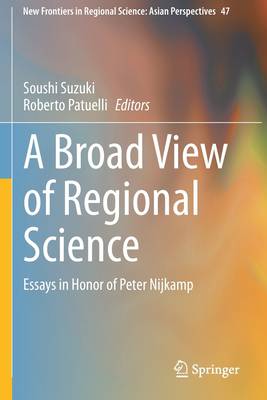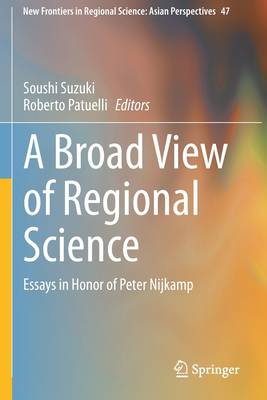
- Afhalen na 1 uur in een winkel met voorraad
- Gratis thuislevering in België vanaf € 30
- Ruim aanbod met 7 miljoen producten
- Afhalen na 1 uur in een winkel met voorraad
- Gratis thuislevering in België vanaf € 30
- Ruim aanbod met 7 miljoen producten
Zoeken
A Broad View of Regional Science
Essays in Honor of Peter Nijkamp
€ 244,45
+ 488 punten
Omschrijving
Foreword.- Preface.- Part Ⅰ New perspectives, modelling and methodology in Regional Science.- Chapter 1: The cost of missed EU integration.- Chapter 2: On the Existence of an Equilibrium in Models of Local Public Good Use by Cities to Attract the Creative Class.- Chapter 3: Canadian Regional Science 2.0.- Chapter 4: Dynamic Sustainability: Back to History to Advocate for Small and Medium Size Towns.- Chapter 5: Peripheral Urban Areas: Perspectives on Sustainable Regeneration.- Chapter 6: Cities and Spatial Data in the New Urban World - A Data-Analytic Exploration.- Part Ⅱ Society and Culture.- Chapter 7: Group-size bias in the measurement of residential sorting.- Chapter 8: Entrepreneurial Interest of University Students in a Multicultural Society.- Chapter 9: How can small-scale measures of Human Development Index (HDI) be used to study the local potential for sustainable economic growth?.- Chapter 10: Ceteris Paribus and Fixed Effects in Regional and Cultural Economics.- Chapter 11: Horizontal Transmission of Civic Capital and the Emergence of Cooperation: An Agent-Based Modelling Approach.- Part Ⅲ Tourism and Information.- Chapter 12: Peter Nijkamp on the move: crossing borders between regional science and tourism studies.- Chapter 13: Revisiting Bruges: Investigating the importance of tourist crowding perception in the visitor experience through computational text analysis.- Chapter 14: Exploring User Behavior in Destination Websites: An Application of Web Mining Techniques.- Chapter 15: The Role of Visualisation in Spatial Planning: A GIS-based Approach.- Part Ⅳ City, Environment and Sustainability.- Chapter 16: Towards the implementation of the circular economic model in metropolitan cities: the case of Naples .- Chapter 17: Large cities as the cradle of sustainable energy innovation.- Chapter 18: Are CO2 emission targets of C40 cities realistic in view of their mayoral powers regarding climate policy?.- Chapter 19: Economic Impact Analysis of Installing Renewable Energy: A Multiregional Input-Output Model for a small region and the rest of the country.- Chapter 20: A performance assessment of Japanese cities by means of Data Envelopment Analysis.
Specificaties
Betrokkenen
- Uitgeverij:
Inhoud
- Aantal bladzijden:
- 419
- Taal:
- Engels
- Reeks:
- Reeksnummer:
- nr. 47
Eigenschappen
- Productcode (EAN):
- 9789813341005
- Verschijningsdatum:
- 21/01/2022
- Uitvoering:
- Paperback
- Formaat:
- Trade paperback (VS)
- Afmetingen:
- 156 mm x 234 mm
- Gewicht:
- 625 g

Alleen bij Standaard Boekhandel
+ 488 punten op je klantenkaart van Standaard Boekhandel
Beoordelingen
We publiceren alleen reviews die voldoen aan de voorwaarden voor reviews. Bekijk onze voorwaarden voor reviews.










